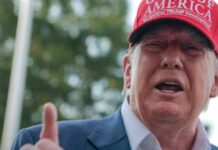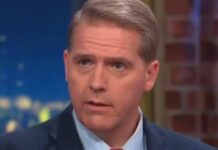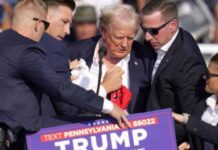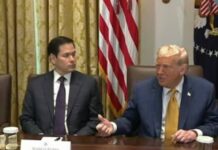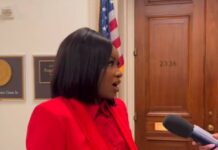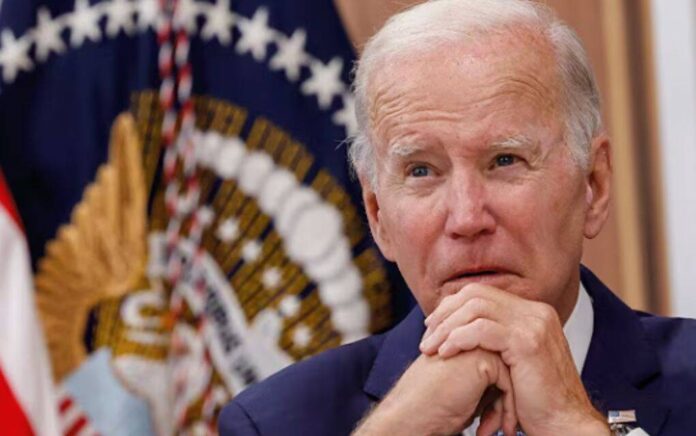
The Biden admin wants to expand the Swamp in Washington, D.C. But now they’re getting exposed for it.
And chaos erupts in the White House after incriminating emails from a Biden official were leaked.
On March 8, 2022, President Joe Biden announced his intention to nominate Joe Goffman to lead the EPA’s Office of Air and Radiation (OAR). On that very day, Goffman reached out to Rich Gold, a prominent Democratic donor and lobbyist at Holland & Knight, to express his gratitude.
“It’s live,” Goffman said in a message to Gold about the job announcement, according to texts reviewed by The Daily Wire. “Will I ever be able to thank you enough?”
The lobbyist replied, “Gotta get good people in these jobs,” and hinted at future collaboration, adding, “And need to chat next steps.”
The text exchange was the first of many between the two, suggesting an ongoing relationship that blurred the lines between government service and private interests. In the months following Biden’s announcement, Goffman provided Gold with sensitive internal information about the EPA, promising in one instance to “pull a rabbit out of the hat” for the lobbyist.
In June 2022, Goffman reversed the cancellation of a meeting between his staff and the American Forest & Paper Association—one of Gold’s clients—despite his busy schedule. In another revealing exchange, Goffman asked, “What do I need to do?”
Gold’s response: “Dance you monkey, dance. I’ll be there. With tomatoes.”
These messages, obtained by the watchdog group Functional Government Initiative through a Freedom of Information Act request and shared with The Daily Wire, provide a glimpse into the cozy relationship between Goffman and the industries he regulates. The messages do not clarify how Gold helped Goffman secure the nomination from Biden, but they suggest the possibility of returned favors. When asked for comment, an EPA spokesperson responded, “A wide array of people supported Joe Goffman prior to and following his nomination.”
Goffman is no stranger to Washington’s “revolving door” between government service and lobbying. His relationship with Gold is emblematic of a broader problem: insiders using connections forged during brief stints in public service to influence their successors in government. Gold, for instance, worked as a special assistant to the EPA administrator from 1993 to 1994 before launching a long career as a lobbyist.
However, Gold wasn’t the only link Goffman had to the industries he regulates. Goffman himself had millions of dollars invested in polluting and chemical-related industries when he took up his post at the EPA, prompting him to recuse himself from cases related to semiconductors, pharmaceuticals, and specialty chemicals. Although he pledged to divest from these industries, emails indicate that the process took longer than expected.
Despite ongoing ethics complaints, Goffman remained in his role, working with stakeholders, including Gold. In March 2023, Gold urged Goffman to meet with Dow, another client of his, before a public comment period ended. Goffman complied, later reporting that the meeting went “excellent.”
Their relationship continued to evolve, with Goffman sharing inside information about the EPA’s Good Neighbor rule, which regulates emissions, after feedback from the paper industry. Gold thanked Goffman for “exceptional client service,” further evidence of their intertwined interests.
Gold even coached Goffman on how to handle automotive rules and gave him a heads-up about potential economic repercussions from EPA decisions. Goffman, in turn, kept Gold informed about developments within the agency, asking for updates on what administration officials were saying behind closed doors.
When the EPA extended its review of a renewable fuel rule, Goffman reassured Gold that the delay would not lead to substantive changes—an insight that would have been invaluable for Gold’s clients while potentially disadvantaging others outside the loop.
Gold also cautioned Goffman about the political implications of regulatory decisions. He warned that environmental rules could influence the extent of support the Biden campaign received from key unions. “You don’t want Steelworkers going to [White House Deputy Chief of Staff] Jen O’Malley-Dillon telling her they’re going to wait to activate campaign activities to see what happens.”
“Exactly. We are working on it,” Goffman replied, acknowledging the delicate balance of environmental policy and political pressure.
Goffman’s ethics troubles didn’t end there. Less than two weeks after signing the Biden administration’s ethics pledge, he admitted to violating its provisions by arranging a meeting with a Harvard University official, his former employer. While he was reprimanded for that breach, he continued to meet with Harvard colleagues and provide agency resources to them, according to ethics complaints filed by Protect the Public Trust.
His exchanges with other lobbyists, including Nicole Distefano—who represents major players in the chemical and energy industries like Chevron—further demonstrate Goffman’s willingness to maintain ties with the private sector. After his official confirmation as EPA assistant administrator in January 2024, by a 50-49 Senate vote, Distefano asked whether Goffman would still be available to her.
“They’re excellent,” Goffman responded, confirming that their relationship would continue.
The Functional Government Initiative criticized Goffman’s actions, calling him a “swamp creature” and questioning whether his eagerness to share inside information with Gold or his expectation of receiving intel in return was more concerning.
As Goffman continues his work at the EPA, these revelations cast a shadow over his leadership and raise important questions about the influence of lobbyists within one of the nation’s most critical regulatory bodies.
Stay tuned to The Federalist Wire.


